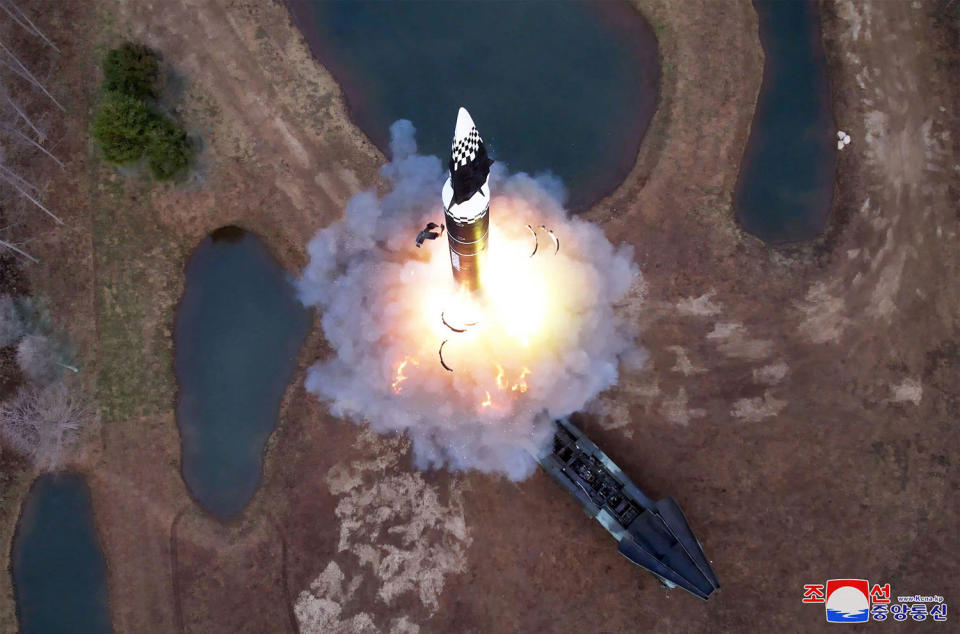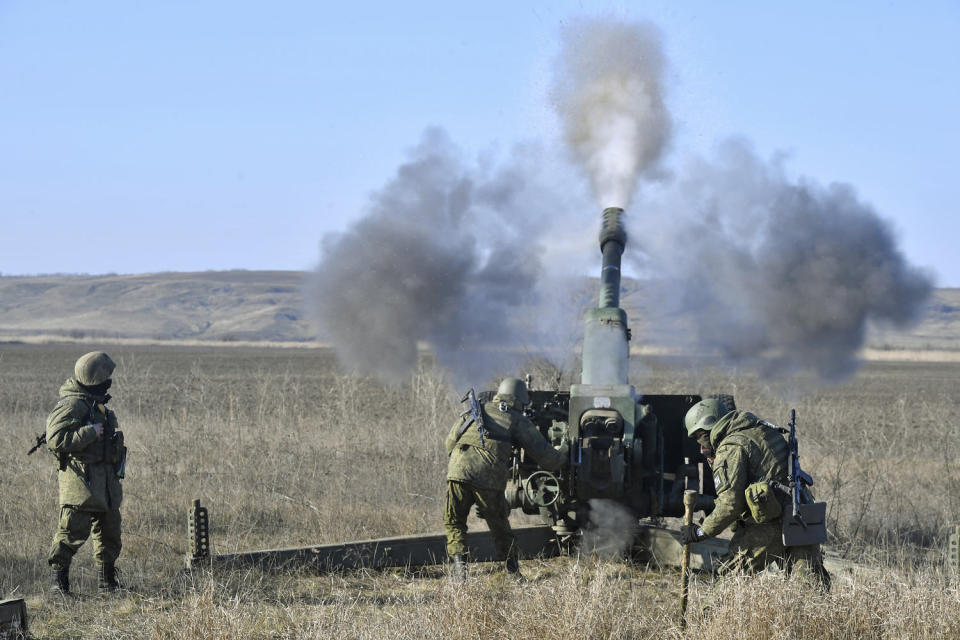Are Russia and North Korea planning an 'October surprise' that aids Trump?
WASHINGTON — The Biden administration is increasingly concerned that the intensifying military alliance between Russian President Vladimir Putin and North Korean leader Kim Jong Un could vastly expand Pyongyang’s nuclear capabilities and increase tensions in the Asia-Pacific region, six senior U.S. officials told NBC News.
U.S. officials are also bracing for North Korea to potentially take its most provocative military actions in a decade close to the U.S. presidential election, possibly at Putin’s urging, the officials said.
The timing, they said, could be designed to create turmoil in yet another part of the world as Americans decide whether to send President Joe Biden or former President Donald Trump back to the White House.
“We have no doubt that North Korea will be provocative this year. It’s just a matter of how escalatory it is,” a U.S. intelligence official said.

U.S. intelligence officials accused Russia of interfering in the 2016 election to help elect Trump. The Biden administration had tense relations with Russia, which collapsed after it invaded Ukraine in 2022.
After the publication of this story, Steven Cheung, a Trump campaign spokesman, said “the only ‘October surprise’ will be the look of shock” among reporters when Trump wins re-election.
With Putin expected to visit North Korea to meet with Kim in the coming weeks, U.S. officials expect them to solidify a new deal to expand transfers of military technology to Pyongyang.
“2024 is not going to be a good year,” said Victor Cha, senior vice president for Asia and Korea chair at the Center for Strategic and International Studies. “It’s going to be a bit of a roller coaster.”
A burgeoning alliance
U.S. intelligence officials believe Putin is providing North Korea with nuclear submarine and ballistic missile technology in exchange for Pyongyang’s sending Russia large amount of munitions for its war in Ukraine, the senior U.S. officials said. North Korea provides Russia with more munitions than Europe provides to Ukraine, including millions of artillery shells.
Officials are also concerned that Russia might help North Korea complete the final steps needed to field its first submarine able to launch a nuclear-armed missile.
In September, North Korea unveiled a submarine, based on an old Soviet model, but U.S. officials said Pyongyang was most likely exaggerating its capabilities. They said the submarine still needed additional technology before it could deploy or launch a nuclear-armed missile.
Despite repeatedly offering to begin talks without any conditions, the U.S. has had no significant dialogue with the Kim regime for three years, the officials said. The administration reached out to North Korea again this year, but it did not respond.

U.S. officials said they do not have an entirely clear understanding of the types of technology Russia is supplying North Korea. Unlike weapons transfers that can be physically tracked, sharing of military technology is not as easily detected.
“The higher-end Russia technical assistance comes in forms that are very difficult indeed to monitor,” a senior administration official said.
U.S. officials cautioned that the North Korean ammunition is most likely old and unreliable. But North Korea sent the artillery at a time when Ukraine was struggling with stockpiles and had to ration ammunition, so the influx gave Russia an advantage on the battlefield.
The officials said that in exchange for the ammunition it is providing Moscow, North Korea wants Russia to provide it with ballistic missile parts, aircraft, missiles, armored vehicles and other advanced technologies.
In recent months North Korea has continued to advance its missile program, including testing a solid-fuel engine for a hypersonic missile and other incremental advances that together have made its missile program more reliable, U.S. officials warn.
Pyongyang has long sought a long-range ballistic missile able to fly thousands of miles and then re-enter the atmosphere with the payload intact. U.S. officials warn that Russia could now be helping it achieve the final steps. A nuclear-capable missile with survivable re-entry vehicles would present a significant challenge for U.S. missile defense systems.
U.S. officials also said there has been increased activity at one of the North Korean nuclear test facilities, which could indicate preparations for another test. Satellite images published in April by Beyond Parallel, a project examining the Korean Peninsula at the Center for Strategic and International Studies in Washington, showed activity at Tunnel No. 3 at the Punggye-ri nuclear facility.
The group said that “both the United States and South Korea have assessed North Korea as having completed all the required preparations for conducting a seventh nuclear test from the tunnel.”
The Biden administration has been expecting a nuclear test from North Korea for some time. The U.S. recently prepared contingency plans for how to respond if Kim takes aggressive actions in the demilitarized zone with South Korea or shells South Korea’s border islands, which he has not done since 2010.
“We are going to be ready and prepared,” the senior administration official said, noting the administration’s coordination with South Korea and Japan.
U.S. officials said they are also concerned that Moscow could help North Korea with its domestic manufacturing of weapons and even create a defense industrial base partnership.
An 'October surprise'?
Whether or not Putin encourages Kim to take provocative actions designed to create a so-called October surprise in the U.S. presidential election, a second senior administration official said Russia might hesitate to such a step. The official said China, which has also grown closer to Russia and helped Putin wage his war in Ukraine, typically does not want instability in the region.
Still, U.S. officials concede there is much about the Russia-North Korea alliance — and where it could go from here — that they do not know. Increased tensions in the Asia-Pacific region would come after two wars have broken out since Biden took office: one in Ukraine and the other between Israel and Hamas.
Trump has argued that both wars are a result of Biden’s leadership and would not have happened were he in office. Biden White House officials vehemently dispute that claim.
The increasingly close relationship between Putin and Kim represents a major shift from when Russia worked with the U.S. in the past to try to rein in North Korea. Now, Moscow is using its veto power on the U.N. Security Council to give Pyongyang cover to evade sanctions enforcement measures intended to constrain its nuclear program.
“This is an enormous shift,” the second senior administration official said.
This article was originally published on NBCNews.com

